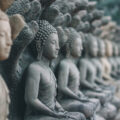A Chinese Confucian perspective on the modern meaning crisis
A Chinese Confucian perspective on the modern meaning crisis
In this postmodern age, many are experiencing a meaning crisis. In this weekly comment, Timo Pieters argues that we could find solutions in Confucianism.
This weekly comment was written by Timo Pieters and reflects his personal analyses and opinions, rather than those of EARS.
The postmodern meaning crisis
As postmodern humans, we have been undeniably shaped by the process of modernisation. As early as 1075, the phrase ‘our modernity’ (modernitas nostra) was first used by Berthold von Regensburg to describe his own time.[1] It is quite ironic that, ever since then, many people in successive ages have declared their own times as truly ‘modern’, as we still do today.
The way von Regensburg reflected upon his own position from a meta-perspective, often called ‘self-reflexivity’, has been part of modernity ever since. In fact, it has gone so far that in our current postmodern age many people feel like their lives have lost all meaning and purpose. While the world has been stripped of much superstition, dogmatism, and authoritarian power structures from the past, many people now feel adrift in the indifferent ocean of existence, without any rudder to guide them. How did this meaning crisis come about?
The secular outlook
As I just mentioned, modernity has been strongly driven by the two forces of (1) increased self-reflexivity, and (2) an increased capacity to exert power over nature and other people. This self-reflexivity has led to a very ambivalent relationship toward traditional knowledge. The modern belief in progress could even be seen as a fundamental mistrust of anything traditional. The second force has largely been caused by our increased capacities for production (due to technology) and prediction (due to science).[2]
Disenchantment
A third aspect of the modern worldview is ‘disenchantment’. This refers to the fact that meaning and value have gradually receded from the external world, until they were eventually confined to the insides of the human mind.[3] The common idea that we need to ‘give’ life meaning is based on this disenchantment. After all, if life had intrinsic meaning, we would not have to give it any meaning.
While a medieval person would view the universe as something that was alive, and filled with moral forces and entities that everyone was connected to, the modern universe is largely dead and devoid of significance. One of the causes of this has been our increasingly mechanistic understanding of the universe through science.[4] Because of this disenchantment, morality gradually became seen as a product of the human, rational mind, rather than as a set of cosmic principles.
Secular humanism
This brings us to secular humanism, which flourished during the 18th-century Enlightenment. Values like freedom, equality, human rights, privacy, rationality, progress, and individualism largely became common sense. The highest goal for humanism was therefore for individual humans to actualise themselves. As a consequence, it was strongly opposed to anything that prevented this self-actualisation, such as treating human beings in an instrumental way.[5] Secular humanism therefore placed humanity at the centre of all things, where humans almost began to occupy the position of God as the great ‘creator’ and ‘lawmaker’. In other words, man was the measure of all things.
However, as the Confucian philosopher Tu Weiming points out, the Enlightenment ethos had a paradoxical effect, which is that it produced a lot of inequality by emphasising the universally beneficial nature of self-interest. This allowed egoism and greed to flourish, and arguably contributed to the aggressive exploitation of other cultures and regions in the pursuit of profit. He argues that this is partly because notions like community and global stewardship were almost absent in the Enlightenment project. While the principle of ‘fraternity’ was asserted during the French Revolution, it has received surprisingly little attention. According to Weiming, these contradictions make it impossible for the modern, enlightened lifestyle to be exported globally.[6] Is there a solution to this?
How to address the meaning crisis?
Perhaps, in order to solve this meaning crisis, we need to broaden our scope of what we see as valuable philosophical resources, and start looking at what other cultures have produced over time. One of the cultures that has been especially neglected in this regard is the civilisation of China. In particular, its tradition of Confucianism might be an interesting conversation partner for secular humanists, since it has been described as a kind of ‘spiritual humanism’.
Confucianism as ‘spiritual humanism’
While I can only describe a few aspects of Confucianism here, it will suffice to say that it is arguably the most influential tradition in the history of China.[7] European missionaries became quite fascinated with it, and with Chinese cosmology in general.[8]
Chinese cosmology is broadly based on the two principles of yin (Earth)and yang (Heaven); the receptive and generative life forces (Qi) which are in a continuous, back-and-forth dance with each other. The human being is one of the products of this dance, and is not seen as separate from these cosmic forces at all. In fact, to use a Chinese metaphor, humanity is part of one body, which includes Heaven, Earth, and all things.[9]
Expanding circles of embodiment
As Tu Weiming explains, the Confucian tradition therefore sees human flourishing as a process that moves from the individual to the collective through six expanding circles:
- Flexible selfhood through overcoming selfishness.
- Family cohesiveness through overcoming nepotism (favoritism).
- Communal solidarity through overcoming parochialism.
- Societal integration through overcoming ethnocentrism and chauvinism.
- National unity through overcoming aggressive nationalism.
- Unity of Heaven and humanity (tianrenheyi) by overcoming anthropocentrism.[10]
This view of cosmic connection therefore portrays human identity as a nexus of relationships, rather than a solid individual who is trying to maximise their self-interest. This means that the principle of self-interest will need to be replaced with something more expansive, which Tu Weiming suggests should be the golden rule stated in the negative: “Do not do unto others what you would not want others to do unto you.” This could then be combined with the positive principle that “in order to establish ourselves, we must help others to establish themselves; in order to enlarge ourselves, we have to help others to enlarge themselves.”[11]
In conclusion, I agree with Tu Weiming that such an integrated vision of the human condition could be an excellent starting point for a new discourse about the global ethic of humanity.[12] It may not be necessary to entirely dispense with the values of Enlightenment humanism, but they will need to be expanded to include more of reality, namely (1) other cultures, (2) other species, (3) nature itself, and (4) the cosmos at large.
This weekly comment was written by Timo Pieters and reflects his personal analyses and opinions, rather than those of EARS.
Interested in similar topics? Go to our Dashboard and receive free updates.
[1] Gustavo Benavides, ‘Modernity’. In: Mark C. Taylor (eds.), Critical Terms for Religious Studies. London: The University of Chicago Press, 1998, 186-205. p. 186.
[2] Benavides, ‘Modernity’, p. 189.
[3] Charles Taylor, A Secular Age. Cambridge, Massachusetts, and London, England: The Belknap Press of Harvard University Press, 2007. p. 30.
[4] Ibid.
[5] Manschot, ‘Leven op Aarde’, p. 65. This was especially articulated by Immanuel Kant.
[6] Tu Weiming, ‘Beyond the Enlightenment Mentality’. In: Mary Evelyn Tucker, John Berthrong (eds.),
Confucianism and Ecology. Harvard University Press, 85-94. P. 86.
[7] Encyclopedia Britannica: Confucianism.
[8] Tu Weiming, ‘Family, nation, and the world: The global ethic as a modern confucian quest’. In: Social
Semiotics 8/2-3 (2009), 283-295. p. 283.
[9] Weiming, ‘Beyond the Enlightenment Mentality’. p. 93.
[10] Weiming, ‘Family, nation, and the world’. p. 294.
[11] Ibid, p. 286.
[12] Ibid, p. 295.






